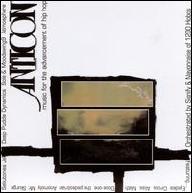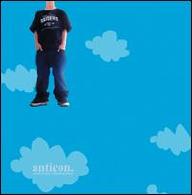The core group of eight came together over the next year, and by the end of 1997 they had started Anticon, with Sole and Doseone acting as the unofficial "leaders." The ground rules were simple: Their artists were encouraged to record as much as they wanted and to work for other labels if they liked, but they would make 50 percent profit from anything they released through Anticon. Sole worked out a deal with Caroline Records, and soon they were distributing Anticon's first singles and compilations in limited release. A number of New York underground MCs, including El-P and members of Company Flow, criticized their records and had a brief press war with Sole, but they were otherwise winning over new listeners with their offbeat approach. Tortoise's John Herndon became one of their biggest supporters in the press, so he brought them to the attention of his publicist, who in turn hooked up with the label and marketed the collective as the hip-hop equivalent of post-rock. The mainstream music press began to cover their releases, and soon they were making enough money to support a weekly showcase in San Francisco, as well as a website and a newsletter. The Internet became a key part of their growth, as fans from around the world could now download tracks from Sole and Themselves, as well as directly speak to the artists through e-mail and their site's message board. Their growing fan base led to a relationship with acid jazz label Mush, who began exclusively distributing Anticon albums by the turn of the century. Between the increased publicity, better distribution, and -- most importantly -- a gifted lineup of what Sole referred to as "avant-garde hip-hop," Anticon had found their niche as one of the most distinct and creative rap labels of their time. ~ Bradley Torreano, Rovi
Anticon
from San Francisco, CA
formed
January 1, 1997 (age 29)
Biography
Believing that rap needs a healthy alternative underground to counter mainstream hip-hop, Anticon is a collective loosely modeled after the American indie rock movement. Made up of eight MCs and producers -- Alias, Doseone, Jel, Odd Nosdam, Passage, Sole, the Pedestrian, and Why? -- the collective pioneered a sound that matches obscure, near-beat poetry lyrics to beats that incorporated abrasive noise samples and unusual time signatures. Their origins started with the Live Poets, a crew based in Maine in the early '90s that was led by Sole. After releasing their own records and trying to create a buzz in the industry, he became disenchanted with the East Coast scene and began seeking other areas of the country with a similar offbeat attitude. He decided to move to San Francisco's Bay Area with fellow Live Poet Alias, where a number of MCs from Minneapolis and Canada were working with local rappers on new and experimental projects. They first met Minnesota native Slug, who was a fan of the Live Poets, and the three decided to work together with California MC Doseone on Deep Puddle Dynamics, an embryonic Anticon project. Although the four MCs had only briefly known one another, they shared a common vision, so they began to look for others who might be interested in starting a label with them.
Top Tracks
Albums
Videos
Close














